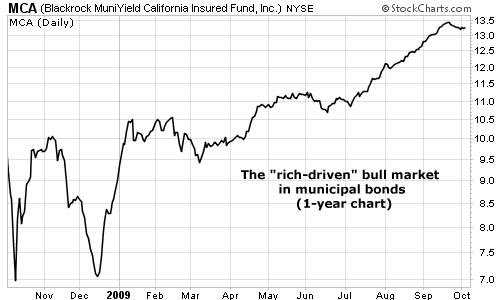| Home | About Us | Resources | Archive | Free Reports | Market Window |
How to Earn 9% from a Cash War ChestBy
Tuesday, October 6, 2009
Gerald Ford is a banking legend...
In the 1980s, when the savings and loan (S&L) industry collapsed, Gerald Ford bought more than 30 failed S&Ls. He turned these S&Ls into profitable banks, and made a fortune. He used the same strategy after the recession of the 1990s, making a second fortune. Today, with a net worth of $1.3 billion, Gerald Ford is No. 559 on the Forbes list of the world's richest people. As we exit the great credit crunch of 2008, Ford is eager to repeat this trick for a third time... The FDIC insures bank deposits. When a bank fails, the FDIC seizes the bank and auctions off the leftover assets to other banks. Ford plans to buy these broken banks from the FDIC. He's already raised $2 billion in cash for this purpose, and he's secured a license from bank regulators to participate in the auctions. I suspect Ford is going to make another billion from this plan. So earlier this year, I advised readers of my newsletter to contribute their money to Gerald Ford's $2 billion "busted bank" war chest. We could have bought stock in Gerald Ford's holding company. It's called Hilltop Holdings. It trades on the NYSE under the symbol HTH. We would have been entitled to whatever profits Gerald Ford's busted bank strategy makes. And we would have been entitled to vote on anything related to Gerald Ford's company. In short, we would have been co-owners with Ford. But we did not buy stock with Gerald Ford. We loaned him money instead... By making the loan, we ensured our money is totally secure. Gerald Ford has a legal obligation to pay us income and redeem our loan at full value. We'll take him to court if he fails to pay us back a single cent he owes us. If we'd bought stock, we'd have no such power. Besides, I knew Gerald Ford would need plenty of time to make his acquisitions. While he looks for opportunities, we're getting 9% a year in income. Shareholders get no income. (Gerald Ford hasn't been able to make a deal. You can read about his frustrations in this recent Forbes article.) Most people don't realize it, but you often have the choice to make a loan instead of a stock investment when looking at a company you like. There are over a thousand "loans" like the one we made to Gerald Ford trading on the major stock exchanges. These loans have symbols just like stocks. You can buy and sell them through any discount broker with two clicks of a mouse. They go in your IRA and command the same commissions and fees. Take the symbol "ATT" on the NYSE as an example. It's a 6.375% senior note issued by AT&T. Or "CPV." It's a 6.75% bond issued by CBS Corp, trading on the NYSE. Comcast issued a 7% bond that matures in 2056. Its symbol is "CCT" on the NYSE. The Gerald Ford loan we made is a "preferred share" issued by his holding company Hilltop Holdings. You can find it under "HTH-PA" on Yahoo Finance. It trades on the NYSE. We're up 32% so far, but it's still a good buy under $25. (It's trading around $24.60 today.) Right now, we're in a time of extreme uncertainty. The stock market has had a huge 60% rally in seven months. And several indicators I follow are pointing toward a potential drop. At this point, I'm much more comfortable making loans to companies, where they must pay me back in full and they have to pay me interest each quarter. This way, I don't have to worry about stock market volatility or dividend cuts. The next time you consider investing in a company, take five minutes to see if it has any loans floating on the NYSE or the Nasdaq. You'll get a much more stable investment with a guaranteed income stream. Quantum Online is the definitive source of exchange-traded fixed-income securities. It's free to set up a username and password. Once you're in, enter a symbol or scroll through the lists of fixed-income securities. Good investing, Tom P.S. I'm currently recommending eight NYSE-traded bonds in my 12% Letter. These bonds pay an average 8% yield. They are issued by some of the safest companies in the world, so our money is perfectly safe, even if we enter another bear market. To learn more about The 12% Letter and to access our fixed-income portfolio, click here.
Further Reading:
This Is the Fastest Way I Know to Make a Fortune Right Now Market NotesTHIS IS WHERE RICH PEOPLE ARE PUTTING THEIR MONEY
For much of the past 12 months, we've encouraged readers to take a position in municipal bonds. And for much of the past 12 months, it's been an incredible idea. Thank the rich...
When a state or local government needs to borrow extra money for projects like highways and water systems, it does so in the form of municipal bonds. To encourage folks to "loan American," the federal government does not tax the interest earned in "munis." Now that the old saw "nothing is certain but death and taxes" has been amended to "death and higher taxes," wealthy people are racing to these legal tax shelters like ants to a picnic. For proof, have a look at the muni bond fund (MCA), mentioned by our colleague Dr. David Eifrig back in June. The fund is up 20% since then – which is a huge move higher for a boring basket of bonds. MCA is no outlier. The charts of nearly every single muni bond fund in America look just the same. Want to know where the rich are putting their money? Look here... 
|
In The Daily Crux
Recent Articles
|

